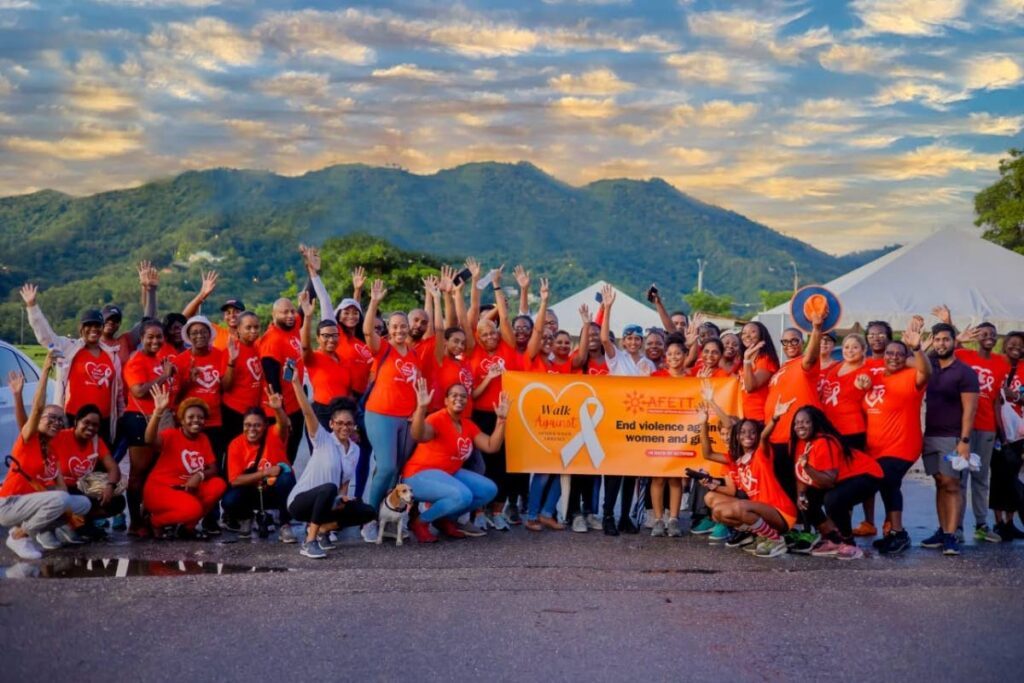16 days of ACTivism with AFETT

Saelese Haynes
For this week’s article, we present AFETT Asks, instead of Ask AFETT.
We are in the period of 16 days of activism against gender-based violence (GBV). This year the theme of the UNcampaign is: UNiTE! Invest to Prevent Violence against Women and Girls, and a call to "Orange The World."
As part of our activities, AFETT held a multi-stakeholder-supported walk against GBV, where we launched our Survival Sisters initiative, which provides "grab bags" of emergency materials and resources for women fleeing violent situations. It will be available shortly through our implementing partner ITNAC.

Our 16 Days of Activism visual campaign features 16 beautiful women – inside and out – who share personal or professional stories of overcoming GBV situations. Posts are shared with the hashtag #AFETT16days.
AFETT is also participating in the UN's Spotlight Initiative Transition Conference – a global, multi-year partnership to eliminate all forms of violence against women and girls by 2030.
Ahead of the conference, our research and public advocacy committee had a virtual interview with Tonni Brodber of UN Women and a panellist at Spotlight’s session on laws and policies to gain her insights on effective ways to prevent GBV.
How can the private sector invest in GBV prevention?
The private sector is critical in the fight against GBV because it can influence societal norms – shaping collective attitudes and behaviours that align with values that contribute to the overall well-being of communities. It can be through internal corporate policies, providing resources for awareness campaigns, supporting employee education and advocating for gender equality.
The private sector is also in a position to engage in public-private partnerships, support NGOs that are focused on policy reform and leverage their corporate influence to champion national policies.
The Women’s Empowerment Principles for Businesses was launched in 2010 and offers guidance on how to empower women in the workplace, marketplace and community.
Examples of impactful initiatives taken by individuals
The Spotlight Initiative has allowed us to engage cultural gatekeepers such as artists, parliamentarians and Trinidad and Tobago's "first lady" Sharon Rowley, who has consistently demonstrated her commitment to end GBV.
UN Women Caribbean will also launch a 16 Days, 16 Ways social media campaign detailing creative and impactful ways the public and private sector can invest and put the ACT in ACTivism.
How did covid19 affect the prevalence of GBV in the Caribbean?
There is evidence that the covid19 pandemic intensified GBV due to lockdowns which resulted in increased isolation, risk for victims and restricted access to support services. Economic stress from loss of jobs/income was also a contributing factor to GBV, with hardship and stress heightening tension in the household and contributing to a rise in domestic violence.
Even as the Caribbean and the world recover, there can be lasting impacts, which emphasises the need for ongoing awareness, support systems and preventative measures.

Stark observations from our 2021 report entitled Summary Status of Women and Men report – The Impacts of Covid19, include:
– TT saw a 119 per cent increase in call volume to the national domestic violence hotline for the period January-October 2020,
– The TTPS observed a 78 per cent year-on-year increase in domestic violence reports between March and August 2020,
– Women aged 15-64 have experienced at least one form of violence, ranging from 39 per cent to as high as 55 per cent, and
– 28-38 per cent of women have experienced physical or sexual violence from a partner in their lifetime.
Pre-covid19 levels of domestic and GBV were already too high in the Caribbean region. GBV national prevalence surveys reveal that appalling numbers of Caribbean women have experienced intimate partner violence…44 per cent in TT…amidst the pandemic, these incidents have increased significantly.
Studies like these are critical because data specific to the Caribbean, which may not always be in abundant supply, provides objective information that helps governments and other policymakers to make informed decisions.
What are some GBV challenges that women and girls face in the Caribbean?
Two things for me, first the available data at UN Women points to a pervasive and worrying domestic violence trend in the Caribbean that continues to persist due to factors including the silence culture, limited support and sometimes gaps in legal frameworks that contribute to the complexity of addressing GBV.
The UN Women Caribbean platform, Caribbean Women Count – Ending Violence Against Women and Girls Data Hub, tracks the prevalence of different forms of intimate partner violence. The data shows that on an average, just under 50 per cent of women have experienced some form of intimate partner violence in their lifetime. That is, one in two women!
Second, social norms work must occur to change perceptions and behaviours that normalise violence as a means to resolve conflict.
Holding peers accountable is not a point that should be underestimated.
What are your hopes and expectations in reducing GBV and advancing gender equality in the Caribbean?
We must continue to build on the work done during the EU-UN Spotlight initiative and continue the collaboration with the government, the private sector, civil society and the development community, including at the individual level where every citizen recognises it is their responsibility to act to prevent violence against women and girls.

Comments
"16 days of ACTivism with AFETT"